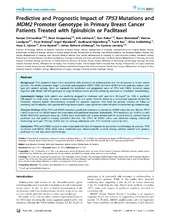| dc.contributor.author | Chrisanthar, Ranjan | en_US |
| dc.contributor.author | Knappskog, Stian | en_US |
| dc.contributor.author | Løkkevik, Erik | en_US |
| dc.contributor.author | Anker, Gun Birgitta | en_US |
| dc.contributor.author | Østenstad, Bjørn | en_US |
| dc.contributor.author | Lundgren, Steinar | en_US |
| dc.contributor.author | Risberg, Terje | en_US |
| dc.contributor.author | Mjaaland, Ingvil | en_US |
| dc.contributor.author | Skjønsberg, Gudbrand | en_US |
| dc.contributor.author | Aas, Turid | en_US |
| dc.contributor.author | Schlichting, Ellen | en_US |
| dc.contributor.author | Fjösne, Hans E. | en_US |
| dc.contributor.author | Nysted, Arne | en_US |
| dc.contributor.author | Lillehaug, Johan | en_US |
| dc.contributor.author | Lønning, Per Eystein | en_US |
| dc.date.accessioned | 2012-02-27T13:43:28Z | |
| dc.date.available | 2012-02-27T13:43:28Z | |
| dc.date.issued | 2011-04-27 | eng |
| dc.Published | PLoS ONE 6(4): e19249 | en |
| dc.identifier.issn | 1932-6203 | |
| dc.identifier.uri | https://hdl.handle.net/1956/5648 | |
| dc.description.abstract | Background: TP53 mutations have been associated with resistance to anthracyclines but not to taxanes in breast cancer patients. The MDM2 promoter single nucleotide polymorphism (SNP) T309G increases MDM2 activity and may reduce wildtype p53 protein activity. Here, we explored the predictive and prognostic value of TP53 and CHEK2 mutation status together with MDM2 SNP309 genotype in stage III breast cancer patients receiving paclitaxel or epirubicin monotherapy. Experimental Design: Each patient was randomly assigned to treatment with epirubicin 90 mg/m2 (n= 109) or paclitaxel 200 mg/m2 (n = 114) every 3rd week as monotherapy for 4–6 cycles. Patients obtaining a suboptimal response on first-line treatment requiring further chemotherapy received the opposite regimen. Time from last patient inclusion to follow-up censoring was 69 months. Each patient had snap-frozen tumor tissue specimens collected prior to commencing chemotherapy. Principal Findings: While TP53 and CHEK2 mutations predicted resistance to epirubicin, MDM2 status did not. Neither TP53/ CHEK2 mutations nor MDM2 status was associated with paclitaxel response. Remarkably, TP53 mutations (p = 0.007) but also MDM2 309TG/GG genotype status (p = 0.012) were associated with a poor disease-specific survival among patients having paclitaxel but not patients having epirubicin first-line. The effect of MDM2 status was observed among individuals harbouring wild-type TP53 (p = 0.039) but not among individuals with TP53 mutated tumors (p.0.5). Conclusion: TP53 and CHEK2 mutations were associated with lack of response to epirubicin monotherapy. In contrast, TP53 mutations and MDM2 309G allele status conferred poor disease-specific survival among patients treated with primary paclitaxel but not epirubicin monotherapy. | en_US |
| dc.language.iso | eng | eng |
| dc.publisher | Public Library of Science | eng |
| dc.rights | Attribution CC BY | eng |
| dc.rights.uri | http://creativecommons.org/licenses/by/2.5/ | eng |
| dc.title | Predictive and Prognostic Impact of TP53 Mutations and MDM2 Promoter Genotype in Primary Breast Cancer Patients Treated with Epirubicin or Paclitaxel | en_US |
| dc.type | Peer reviewed | |
| dc.type | Journal article | |
| dc.description.version | publishedVersion | en_US |
| dc.rights.holder | Copyright 2011 Chrisanthar et al. | |
| dc.identifier.doi | https://doi.org/10.1371/journal.pone.0019249 | |
| dc.identifier.cristin | 839750 | |
| dc.subject.nsi | VDP::Medical disciplines: 700::Clinical medical disciplines: 750::Oncology: 762 | eng |

